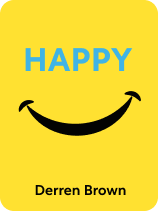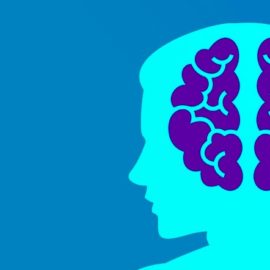

This article is an excerpt from the Shortform book guide to "Happy" by Derren Brown. Shortform has the world's best summaries and analyses of books you should be reading.
Like this article? Sign up for a free trial here.
Looking for an overview of Derren Brown’s book Happy? What is the author’s key advice about understanding and obtaining happiness?
Derren Brown suggests that the answers to happiness can be found in the teachings of the ancient Greek philosophers, like the Stoics and Epicureans. In his book Happy, Derren Brown says that by adopting this kind of philosophy, we can lead thoughtful, balanced, and more well-rounded lives.
Read on for an overview of Derren Brown’s book Happy to learn the fundamental ideas of the book.
Derren Brown’s Happy
We take it as a given that we want to be happy, but how to achieve happiness, or even how to define it, has been a problem that philosophers, theologians, and psychologists have tried to address since humans first learned to articulate the problem. Older eras have sought happiness through lives of virtue and intellectual pursuits, while the modern age places value on achievement, fame, and fortune. In Derren Brown’s book Happy, Brown suggests that there are answers to this problem, but that they might not be found where we expect.
Instead of relying on modern self-help psychology or experts on setting and achieving personal goals, he turns to the works of ancient Greek philosophers for whom the quest for a happy, well-lived life was a practical problem to be addressed and solved. Brown says that by adopting a philosophy of our own, we can lead more thoughtful, balanced, and generally happier lives.
Derren Brown is anything but the stereotypical self-help guru. In his native England, he’s famous as a stage and television magician who highlights the way stories can misdirect the mind. This book was inspired by Brown’s interest in the narratives people use to make sense of their lives and how those stories can be consciously reshaped to help us live more happily in the here and now.
Cornerstones of Happiness
Drawing directly from the Stoics and Epicureans, Brown bases his philosophical approach on the age-old aphorism that the circumstances of our lives aren’t what make us unhappy, but rather how we react to them. Starting from this tenet, he suggests that the cornerstones of happiness are for us to choose contentment over perfection, take responsibility for our lives, and become the authors of our internal narratives.
Derren Brown’s book Happy describes the groundwork that was paved by the early Greek thinkers, for whom the study of philosophy wasn’t merely an academic pursuit, but rather a search for practical values that would help people live happier lives. Some believed that happiness could be found in the contemplation of intangible ideals, such as the perfect abstraction of beauty. Others took a real-world approach and insisted that happiness could be achieved when a person became the best version of themselves. It was from the latter perspective that the Epicureans and the Stoics built their beliefs.
(Shortform note: In modern times, Stoicism has a bad reputation from the common belief that Stoics are unfeeling and detached from the world. Instead, it’s more accurate to say that Stoics are against emotions that cause pain, such as anger, envy, and fear. In The Obstacle Is the Way, Ryan Holliday describes Stoicism as empowering and optimistic. After all, if we accept the Stoic belief that only our thoughts make things good or bad, then every misfortune can become an opportunity if we reframe it as such.)
Barriers to Happiness
Even though we accept it as a given that the pursuit of happiness is core to human nature, most of us suffer from misguided notions about what happiness is, fueled by messages from the media and society. Instead of seeking contentment in the everyday balance between our aims and our troubles, the world at large would have us believe that happiness is something we can win like a trophy. Given that unrealistic societal message, Derren Brown’s book identifies three major obstacles to living a well-balanced, happier life—our culture’s insistence on positive thinking, the ways we let ourselves give in to anger, and the importance we attach to our ambitions and desires.
Positive Thinking
As counterintuitive as it sounds, “positive thinking” (as it’s peddled by the self-help industry and motivational speakers) can be toxic in the extreme. Brown claims that the philosophy of positive thinking oversells its benefits, leads to cycles of shame, and relies on false assumptions about what truly makes us happy.
(Shortform note: While Brown fires shots at proponents of shallow positivity, he doesn’t directly argue against the work of Norman Vincent Peale, who popularized the idea of positive thinking in 1952’s The Power of Positive Thinking. Peale, who practiced as a minister for 50 years and was awarded the Presidential Medal of Freedom, claimed that a positive mindset could overcome any obstacle when combined with faith in yourself and practical efforts toward change.)
In the Happy book, Derren Brown defines positive thinking as the belief that through concentrated hope, prayer, or just wishing really hard, you can influence the universe to manifest your desires. The particular targets of Brown’s ire are faith healers, the prosperity gospel movement, and Rhonda Byrne’s book The Secret, which argues that your thoughts “attract” the things you want. Focusing energy and attention on a project (such as learning to act on the stage) can certainly make a positive outcome more likely (becoming a movie star), but according to Brown, positive thinking proponents overpromise on results while downplaying the importance of random chance (for example, that a famous director might see you perform).
Giving In to Anger
Once your slide into unhappiness begins, more likely than not, you’ll get angry. Anger (along with its cousin, frustration) is the single emotion most destructive to happiness. While anger often feels justified, Derren Brown’s book argues that it clouds anything you might want to communicate, distracts from the issue at hand, and doesn’t resolve anything to your satisfaction. Brown then explains the basic triggers of anger and the steps you can take to disarm it.
(Shortform note: Brown’s depiction of anger and how it’s expressed may seem a little simplistic. Not all anger is loud, showy, and distracting. People who develop an aversion to this type of anger may manifest it in other ways—through withdrawal, self-blame, or unhealthy coping mechanisms. Though this form of anger is more subtle and unconscious, it’s just as destructive to happiness.)
Anger has an evolutionary social purpose; it encourages others not to violate social rules. Brown writes that we feel anger when someone breaks a rule or when we perceive a personal slight (such as when someone cuts ahead of us in line). Anger can also be born out of a combination of irritants and our own temperament (such as when you get frustrated after hearing a song played over and over during the holidays).
Desire and Ambition
In the Happy book, after anger, Derren Brown identifies desire as the next most detracting emotion from happiness. Nearly every choice we make in life is to fulfill some desire, whether big or small, but the pleasure desire brings is always short-lived. Brown explains the nature of what psychologists call the “hedonic treadmill,” while also elaborating on the problems brought on by the search for wealth and fame.
According to Brown and many others, the hedonic treadmill is a self-repeating emotional cycle of desire, pleasure, and disillusionment. It begins like this: You see something you want, whether it be a person, an achievement, or a shiny new toy. You do the work and/or spend the money to achieve the object of your desire, and you’re happy. But it doesn’t last. Whatever it was you desired loses luster, and the temporary joy of receiving it fades. Soon you’re bored, you desire something else, and the cycle starts all over again.
(Shortform note: The causes and effects of the hedonic treadmill go beyond mere emotional satisfaction. In Dopamine Nation, Anna Lembke explains that because our brains evolved in an era of scarcity, our modern age of abundance creates the perfect conditions for indulging our senses and continually stimulating our production of dopamine, the chemical that drives us to seek new rewards. The pain/pleasure cycle of the hedonic treadmill goes into overdrive as our brains build up a tolerance to pleasure, requiring us to work the treadmill harder to achieve the same good feelings as before.)
Derren Brown’s book explains that many desires fueling the hedonic treadmill are driven by our need to impress other people, but the pleasure that comes from “showing up” others is fleeting in the extreme. Comparing ourselves to others breeds envy, even more so when comparing ourselves to those we consider our peers. Comparison and envy place our self-worth and happiness outside ourselves and in the hands of others. It’s the opposite of taking responsibility for our feelings.
(Shortform note: While chasing after status relative to others may sabotage your chances to be happy, it can be valuable in other parts of life. In Pitch Anything, Oren Klaff highlights the importance of relative status for commanding attention. He identifies two types of status—“global,” determined by wealth and position, and “situational,” which fluctuates because of context. Klaff contends that status does matter if you wish to persuade others with an idea, in which case having a higher status than your audience will help your cause.)

———End of Preview———
Like what you just read? Read the rest of the world's best book summary and analysis of Derren Brown's "Happy" at Shortform.
Here's what you'll find in our full Happy summary:
- The definition of happy, according to ancient Greek philosophers and Stoics
- The importance of balancing desires with realities
- How to overcome the three biggest barriers to happiness






